 FILM
FILM In Which We Still Have Not Recovered From This Particular Hangover
 Tuesday, June 16, 2009 at 2:16PM
Tuesday, June 16, 2009 at 2:16PM 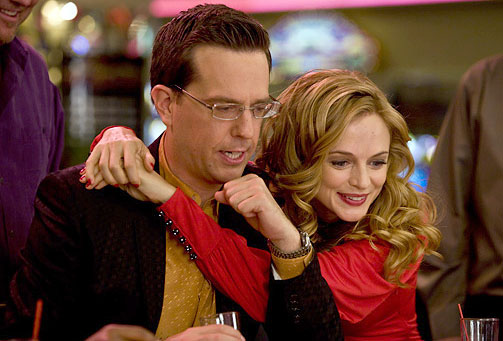
The Docile American Bachelor Party
by ELEANOR MORROW
God forgive me in advance for what I am about to write. A.O. Scott chickened out; it had to be me.
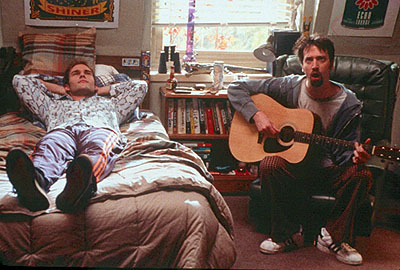
It is a phenomenon, it is the new Big Lebowski, it has everything we require from entertainment and more. "I haven't seen it, but I heard it's the new Old School" crooned Bill Simmons. Shut up, Bill, you're over forty with two kids and no grasp of English.
Men can't express their true feelings, so they express themselves by being away from women. That is the sterling message of Todd Phillips' 90 minute attempt to kill comedy, The Hangover.

A dentist loses a tooth. A loser schoolteacher almost forgets his head. The guy from the Kanye video acts slightly irregular. These are the "wild" dreams of middle-aged men. They are not wild, no more wild than a 16 year old's spring break, or a vibrant afternoon of text messaging. Our idea of the crazy has became crazy.
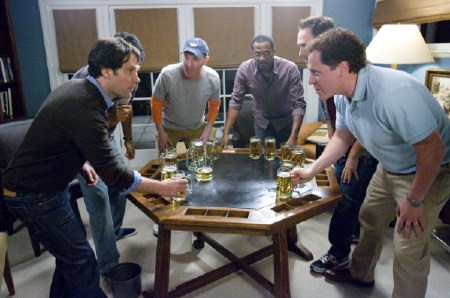
In Judd Apatow's seminal boy-on-boy-on-boy-on-boy love story, Knocked Up, Leslie Mann believes her husband Paul Rudd is cheating on her, perhaps with Phoebe Buffet. She tracked him to a magnificently empty house in the Valley, where he's participating in a fantasy baseball draft with a bunch of other repressed homosexuals. She's upset at finding out she's married a gay man? I couldn't think of any other reason she started crying in the driveway, on a movie set, in front of Katherine Heigl and Seth Rogen. Maybe she really had her heart set on seeing Spiderman.

According to this way of thinking, women are just prostitutes waiting for kind and generous dentists to walk into their lives. Heather Graham looks too much like a Barbie (or admittedly a whore) to be anything but Ed Helms' paramour; a comic actress on the level of Rachael Harris is a high-strung betch who can't cheat and get away with it like Bill Clinton. Justin Bartha was in a fucking Geico commercial and NBC's horrific sitcom Teachers. He deserves no second life in the American cinema just because he banged Ashley Olsen and Lydia Hearst.
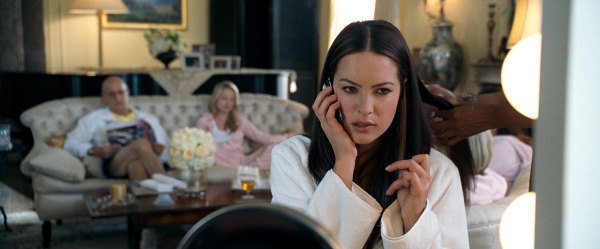
A woman places obligations on a man. Her job is to look good and hold hands at a wedding. A woman is capable of forgiveness but not of understanding, and that is the terms the "men" of The Hangover must deal with their women on. At this they don't have much of any success. That is why they are men to treasure: they can't even excel at having a good time.
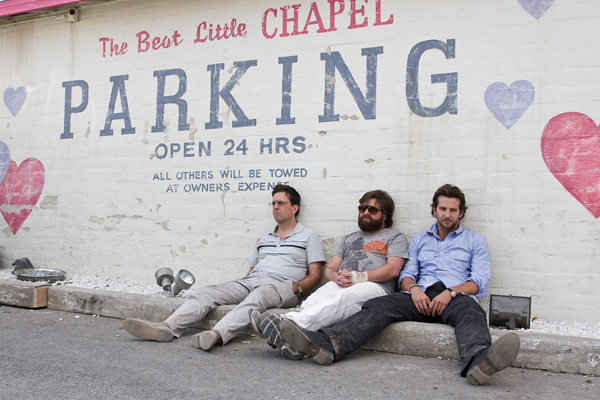
Men when reduced to their primordial urges, get married and promise to take care of whores. What sorts of men are these? Where can they be found? Everywhere: capitalism has compromised their masculinity, like the eunuchs of Greek times. Men used to be able to play with boys, ask Camille Paglia and Sophocles. Now they just play with themselves.
Now they play with baseball players on Yahoo! and ESPN and they draft Hideki Matsui even though he's an aging slugger who can't play the field. Paul Rudd has two kids and wants to bang models; Bradley Cooper hates being a teacher, gets laughs for it. Seth Rogen can't grasp the good fortune that is putting his penis inside of an E! reporter -- he has to whine about it to his father, who is even more of a joke. Ed Helms can't even tell his girlfriend he's going to Vegas for a bachelor party. By the end, he wrests free of her to be the babysitter for some other, identical woman.

Erstwhile poker player Todd Phillips directed this return to more pedestrian fair. It came from a real life hangover suffered by a friend of one of the movie's producers! Just when you thought it was impossible, Entourage is becoming more like real life in retrospect. Men love stories about other men going to Las Vegas, Las Vegas likes this as well, tourism goes up, women go down. Eventually we will be sexually segregated by preferred form of entertainment. Shouldn't the sexes become more like each other instead of less? Wasn't Ellen Page an inspiration to us all?
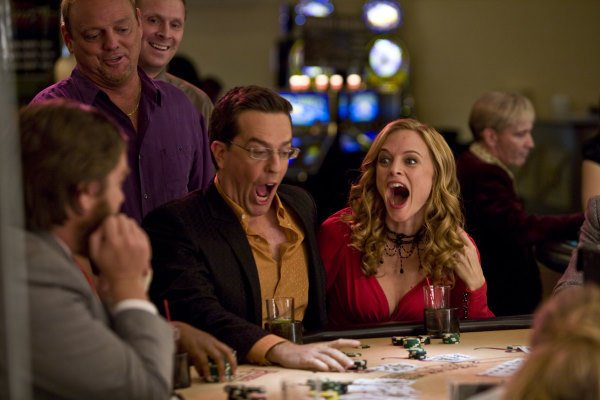
Then again, there is a passivity bred into these creatures. They just want the weekend; the rest of the time they are totally psyched to cave in, to live a life of small-time, Adam Carolla-esque complaining. We can assume despite his history as a boxer, despite his puffy grandstanding on Los Angeles-area radio, that Carolla is a total pushover for his wife. They're family men at heart, "some guys just can't handle Vegas." In between we must suffer every measure of overdone joke imaginable.
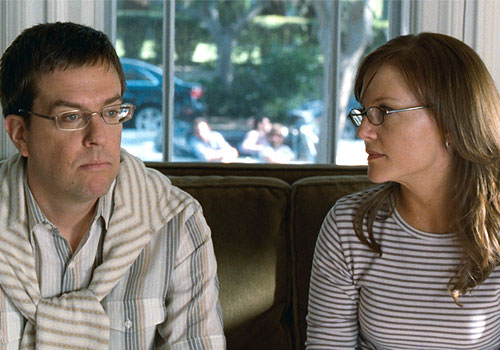
Here are some jokes I can do without going forward:
A strange animal approaches a drug-addled male as in Harold and Kumar. A tiger isn't funny simply because it's a tiger. It's even less funny if it's Mike Tyson's tiger, especially in light of the loss of his daughter in recent weeks.
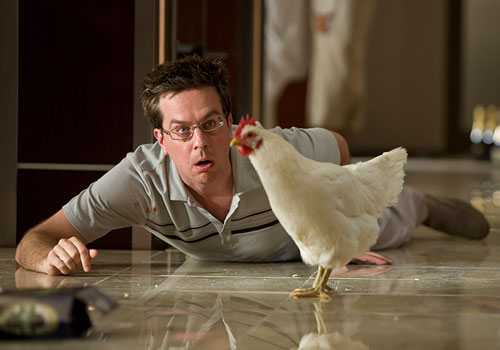
When a person is saying something inappropriate about another person and they are present, he says, "Excuse me! I'm right here!" I'm pretty sure Neil Simon wrote this joke, and I'm just as sure it's not funny.
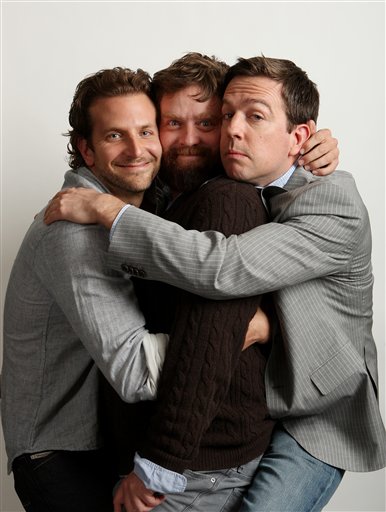
Bradley Cooper is not funny, at least not unless Ryan Murphy is writing his dialogue. This rule also goes for Joe Rogan, but I don't think he was in The Hangover.
The all-star comedy super special cameo: I am tired of Mike Tyson, of Valerie Bertinelli (not relevant here, but still), of Frank the Tank, of Snoop Dogg in Starsky & Hutch. I blame test audiences for all of this, I blame them for being surprised so that we can't be surprised. I blame test audiences for Star Trek and The Dark Knight. It is actually possible to make a work of art that is not offensive to any particular sensibility, and not challenging to any of them. The fact that we can all agree something is entertaining is the number one indication that it's not very good.
This does not make The Dark Knight or The Hangover bad per se; it doesn't make them art either.
One comedic sensibility is learned from the previous generation. If middle-aged men find their childish man-boy escapes to the city of sin a welcome release from the economic grind of this age, fine. But good for Todd Philips for imposing an R rating. I'd rather our kids be Pixar funny than Old School-funny.
Eleanor Morrow is the senior contributor to This Recording. She lives in Manhattan, and tumbls here.
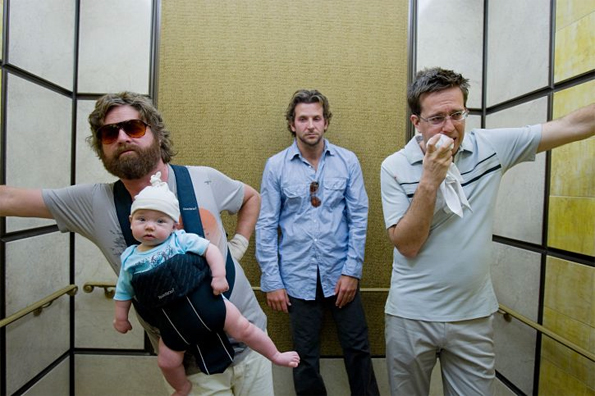
"Heavy Cross" - The Gossip (mp3)
"Pop Goes the World" - The Gossip (mp3)
"8th Wonder" - The Gossip (mp3)

 eleanor morrow,
eleanor morrow,  the hangover
the hangover 
















































































